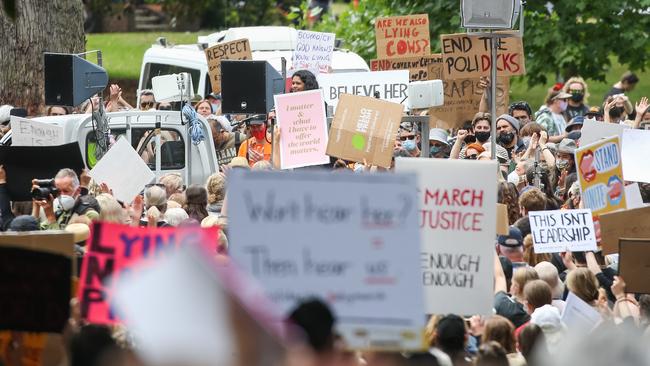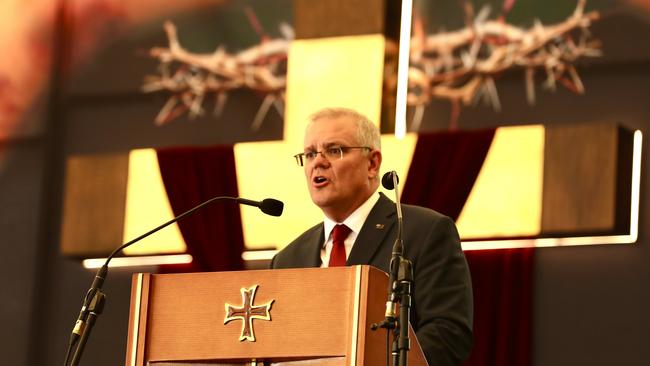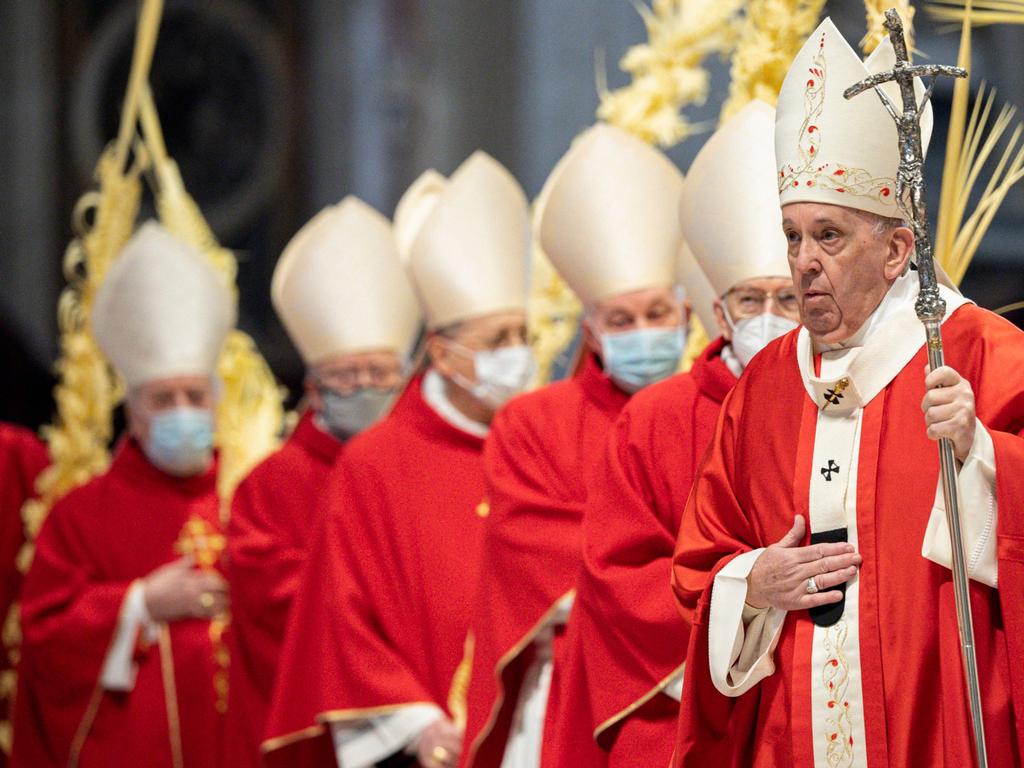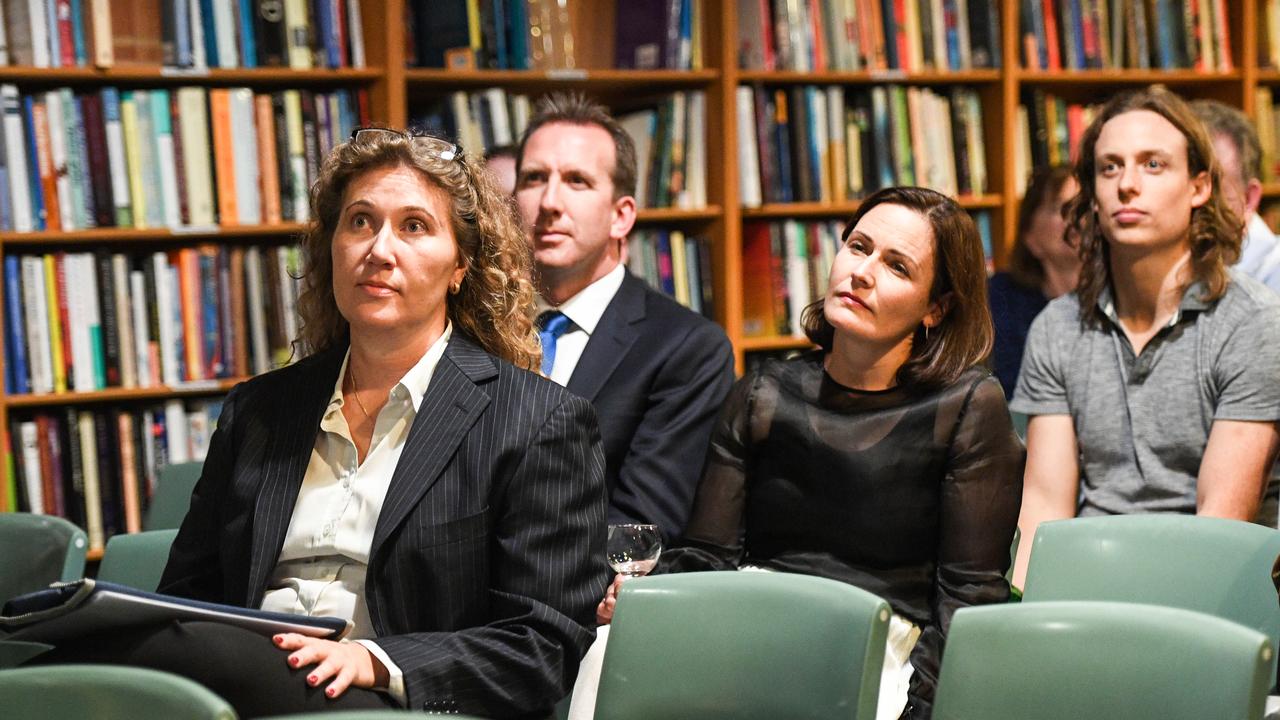Confected ‘justice’ brigade is blind to the real problem
There is one place in Australia where real evil against women and children is consistently ignored.

This Easter, as we approach the end of the pandemic, we are supposed to be thinking about the resurrection, the most powerful symbol of hope for 2000 years — but we probably have our minds on less elevated concerns.
Instead of dwelling on the great symbol of the triumph of life over death, of good over evil, we are immured in petty scandals, pure hypocrisy and almost comic posturing by members of parliament and the media. Witnessing the spectacle of grim-faced women on the high ground and breast-beating men trying to placate the manufactured fury of the mob is emblematic of our inability to unravel reality from perception, truth from falsehood.
A lot of people were asking what exactly was that women’s march about? What were their specific complaints? No one could really answer that question because there was no answer. Instead, the media has to keep on using the tired trope of the “Canberra bubble”. Canberra is not a bubble. Canberra, the national parliament, is a microcosm of the whole of Australian society.
The people in parliament are no better or worse than any in Australia, which is both a wonderfully free society and one that has become weighed down by ideological correctness. In our hypersexualised society, which infects women as much as men, the family has been deconstructed. Consequently, Western society is losing its centre, so we have trouble disentangling the real from the image, truth from falsehood, especially in sexual relations. It is a society where the mainspring is power, not love. It is a society that, to preserve some semblance of order and decency, encourages hypocrisy — and hypocrisy is not the sole preserve of men.

However, there is one place in Australia where real evil against women and children is consistently ignored, and it wasn’t addressed by the women marching on parliament. Rather, it was addressed by three women led by Jacinta Price who arrived at Parliament House on another day and sat quietly in the public gallery. They looked very different from most of the marchers because they were black, and they are the ones who really have something to complain about.
For years, their situation has been the stuff of nightmares. For years, the damning reports about what they and their children endure every day has been our nation’s greatest shame. The places where those women live exist in convenient isolation from where the media and most of the marchers live. Make no mistake, the marching women were never marshalled to march for them. Instead, a political demonstration, and indeed an entirely confected political crisis, was hypocritically presented as some great wellspring of female dissatisfaction against the whole male sex. That is a feminist mental landscape that only values and craves power. The real misery of Indigenous women was not the main focus of that demonstration, although the group of three women, who appeared in parliament at the tail end, should have been the ones leading it, not the newly found heroine Brittany Higgins.
Unfortunately, during this debacle, Scott Morrison, a sincere Christian person who has done a good job (and still has an approval rating far and above Anthony Albanese) seems to have lost the sheer guts necessary for a member of the church militant. Rather, he looks like he is being pushed around because he keeps on apologising. For what? Parliamentarians, particularly the Prime Minister, are supposed to address everyday important issues. At this time, and for the past few weeks, the most pressing issue was the growing flood crisis. Not too many women sweeping the floodwaters out of their houses or, worse, hopping in a tinny to get away from the deluge were worrying about whether they were getting the requisite amount of respect from various males.
That is the real reason Morrison’s popularity has slipped. It’s not because he hasn’t addressed the issue for women (whatever “the issue” is) — but because he is acting like a wuss. It is, frankly, a purely political situation, and he is not calling it. He, like a lot of people in public life, is so hamstrung by the demands of ideological and emotional kowtowing that he is unable to identify the truth from falsehood, the image from reality.
The Prime Minister is, indeed, a good man and a practising, if not practical, evangelical Christian. One of the main lessons of Christianity is not to back down in the face of hypocrisy — and modern life, both in and out of politics, ruled by the norms not of good and evil but solely of “acceptable” behaviour, is full of it.
Christian commentators have decried the lack of Christian ideals in the sexual moral landscape. But Christian sexual morality requires something that is alien in our social hierarchy of values. It requires love. And not just erotic love, but the more profound type of love that gives and gives. It is enshrined in the emblem of the cross; it is the love that Jesus gave when he gave his life. It is love that is more powerful than power. Power is the antithesis of love, and I suspect that many women, and men, in Australia still instinctively know this.






